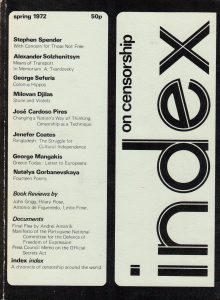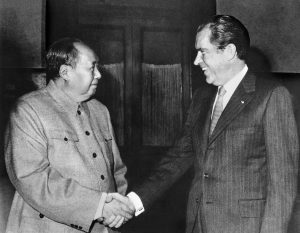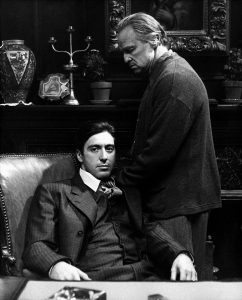1 May 1977 | Magazine, Magazine Editions, Volume 6.03 May 1977
[vc_row equal_height=”yes” el_class=”text_white” css=”.vc_custom_1474815446506{margin-top: 30px !important;margin-right: 0px !important;margin-bottom: 30px !important;margin-left: 0px !important;background-color: #455560 !important;}”][vc_column width=”1/2″ css=”.vc_custom_1478505578743{padding-top: 60px !important;padding-bottom: 60px !important;background: #455560 url(https://www.indexoncensorship.org/wp-content/uploads/2012/01/magazine-banner2.png?id=80745) !important;background-position: center !important;background-repeat: no-repeat !important;background-size: cover !important;}”][/vc_column][vc_column width=”1/2″ css=”.vc_custom_1474721694680{margin-top: 0px !important;margin-bottom: 0px !important;padding-top: 0px !important;padding-bottom: 0px !important;}”][vc_custom_heading text=”SUBSCRIBE TO
INDEX ON CENSORSHIP MAGAZINE” font_container=”tag:h2|font_size:24|text_align:left” use_theme_fonts=”yes”][vc_column_text 0=””]Every subscription helps Index’s work around the world
 SUBSCRIBE[/vc_column_text][/vc_column][/vc_row]
SUBSCRIBE[/vc_column_text][/vc_column][/vc_row]
7 Dec 2023 | Chile, News and features, United States
It is oddly appropriate that Henry Kissinger should have died in the year that commemorates the 50th anniversary of the 1973 military coup in Chile — the cataclysmic overthrow of its democratically elected president, Salvador Allende, and the end of a fleeting attempt to create a socialist society without resorting to violence, a first in the history of revolutions.
As national security advisor to President Nixon, Kissinger ferociously opposed Allende and destabilized the Chilean government by every means possible. He considered that, were Chile’s peaceful movement for social and economic justice to succeed, American hegemony would suffer. He feared that the example might spread and affect the world balance of power.
And Kissinger not only fostered the ousting of a democratically elected foreign leader, he subsequently supported the murderous regime of General Augusto Pinochet, even as the dictatorship was massively violating the human rights of Chile’s citizens, most egregiously in the cruel and terrifying practice of “disappearing” opponents.
It is these desaparecidos whom I think about now, as Kissinger is feted by a shameless bipartisan Washington elite. All these years after the coup in Chile, 1,162 men and women are still unaccounted for. The contrast is telling and significant: Kissinger will have a memorable, almost regal, funeral, while the victims of his policies have yet to find a small place on Earth where they can be buried.
If my first thoughts, when I heard the news about Kissinger’s death, were filled with memories of my missing Chilean compatriots — several of them had been dear friends — soon enough a flood of other casualties came to mind: the countless dead, wounded and disappeared in Vietnam and Cambodia, in East Timor and Cyprus, Uruguay and Argentina. The Kurds Kissinger betrayed; the apartheid regime in South Africa he bolstered; the Bangladeshi dead he belittled.
I always dreamed that a day would come when Kissinger would stand in a court of law and answer for his crimes.
It almost happened. In May 2001, Kissinger was sojourning at the Ritz Hotel in Paris when he was summoned to appear before French Judge Roger Le Loire as a witness in the case of five French nationals who had been disappeared during the Pinochet dictatorship. Rather than take that occasion to explain himself and vindicate his reputation, Kissinger immediately fled France.
Nor was Paris the only city in which he was pursued. Spanish Judge Baltazar Garzón unsuccessfully requested that Interpol detain the former U.S. secretary of State to answer questions in the ongoing trial of Pinochet for human rights violations (the general was arrested in London but finally remanded to Chile, where he died, never convicted, in 2006).
Nor did Kissinger deign to respond to Argentine Judge Rodolfo Corral about the infamous and lethal U.S.-backed Operation Condor in Latin America, or to Chilean Judge Juan Guzmán about the murder of American citizen Charles Horman in the days just after the coup (a case that inspired the Costa Gavras film “Missing”).
And yet I nursed the impossible dream: Kissinger in the dock. Kissinger held accountable for so much suffering. A dream that vanished with his death.
The more reason for that trial to happen in the court of public opinion. The disappeared of Chile, the forgotten dead of all those nations Kissinger devastated with his “realpolitik,” are crying out for justice.
I do not wish that Kissinger may rest in peace. I hope, on the contrary, that the ghosts of those multitudes he damaged beyond repair will trouble his memory and haunt his history.
Whether that happens depends, of course, on us, the living, on the willingness of humanity, amid the din and deluge of praise and eulogies, to listen to the hushed, receding voices of Kissinger’s victims and vow never to forget.
This article was originally published by the LA Times and republished here with permission
18 Mar 2022 | 50 years of Index, China, History, Ireland, Magazine, News and features, Philippines, United Kingdom, United States, Volume 51.01 Spring 2022 Extras
[vc_row][vc_column][vc_column_text]

The first issue of Index on Censorship magazine, in March 1972.
You may have heard that the 70s were different. In 1972, when the first issue of Index magazine was launched, no one knew that 20 years later there would be an influential economic bloc called the European Union. The Beatles’ had only just split. The World Trade Center in New York was being built, while Sir Edward Heath was the prime minister of the United Kingdom.
Fifty years on and some things remain. Queen Elizabeth’s reign goes on and celebrates its 70th anniversary in 2022. Dictatorships and censorship, which should be trapped in history books, continue to torment the lives of many. And as a result, Index on Censorship remains vigilant, defending freedom of expression and giving voice to those who are silenced.
As we celebrate our 50th anniversary, we go back in time and remember the remarkable events that happened in 1972.[/vc_column_text][vc_custom_heading text=”1″][vc_column_text]January 30th: British soldiers shoot 26 unarmed civilians during a protest in Derry, Northern Ireland. Fourteen people were killed on this day known as “Bloody Sunday”. [/vc_column_text][vc_custom_heading text=”2″][vc_column_text]February 1st: Paul McCartney and the Wings release “Give Ireland back to the Irish” in the UK. It would be banned by the BBC, nine days later. [/vc_column_text][vc_custom_heading text=”3″][vc_column_text]February 5th: Airlines in the United States begin to inspect passengers and baggage. Tough to imagine that people traveled without any surveillance. [/vc_column_text][vc_custom_heading text=”4″][vc_column_text]February 17th: British Parliament votes to join the European Common Market. In 2020, the United Kingdom would leave the European Union. [/vc_column_text][vc_custom_heading text=”5″][vc_column_text]February 21st: Richard Nixon becomes the first US president to visit China, seeking to establish positive relations in a meeting with Chinese leader Mao Zedong, in Beijing.

Mao Zedong and Richard Nixon during Nixon’s historical visit to China in 1972. Photo: Ian Dagnall/Alamy
[/vc_column_text][vc_custom_heading text=”6″][vc_column_text]March 15th: The Godfather, starring Marlon Brando and Al Pacino, premieres in New York. It wins Best Picture and Best Actor (Brando) at the 45th Academy Awards.

Al Pacino and Marlon Brando in the Godfather. The first film of one the most successful franchises of all time was released in 1972. Photo: All Star Library/Alamy
[/vc_column_text][vc_custom_heading text=”7″][vc_column_text]June 18th: British European Airways Trident crashes after takeoff from Heathrow to Brussels, killing all 118 people on board. [/vc_column_text][vc_custom_heading text=”8″][vc_column_text]July 1st: Feminist magazine Ms, founded by Gloria Steinem, publishes its first issue, with Wonder Woman on the cover.[/vc_column_text][vc_custom_heading text=”9″][vc_column_text]August 4th: Uganda dictator Idi Amin orders the expulsion of 50,000 Asians with British passports.
[/vc_column_text][vc_custom_heading text=”10″][vc_column_text]September 4th and 5th: 11 members of the Israeli Olympic team are murdered by a Palestinian terrorist group in the second week of the 1972 Olympics in Munich.[/vc_column_text][vc_custom_heading text=”11″][vc_column_text]September 21st: Philippines President Ferdinand Marcos declares martial law. In 2022, his son Ferdinand ‘Bongbong’ Marcos is running for president. [/vc_column_text][vc_custom_heading text=”12″][vc_column_text]October 13th: A flight from Uruguay to Chile crashes in the Andes Mountains. Passengers eat the flesh of the deceased to survive. Sixteen people are rescued two months later.[/vc_column_text][vc_custom_heading text=”13″][vc_column_text]November 30th: BBC bans “Hi, Hi, Hi”, by Paul McCartney and The Wings, due to its drug references and suggestive sexual content. [/vc_column_text][vc_custom_heading text=”14″][vc_column_text]December 7th: Apollo 17 is launched and the crew takes the famous “blue marble” photo of the entire Earth.

The earth seen from the Apollo 17 spacecraft. Photo: NASA/Alamy
[/vc_column_text][vc_custom_heading text=”15″][vc_column_text]December 28th: Kim Il-Sung takes over as president of North Korea. He’s the grandfather of the country’s current leader, Kim Jong-un. [/vc_column_text][vc_custom_heading text=”16″][vc_column_text]December 30th: US President Richard Nixon halts bombing of North Vietnam and announces peace talks in Paris, to be held in January 1973. [/vc_column_text][/vc_column][/vc_row]
![]() SUBSCRIBE[/vc_column_text][/vc_column][/vc_row]
SUBSCRIBE[/vc_column_text][/vc_column][/vc_row]



